Sydney Herbert Davies is a veteran of the Civil War. Still, this soldier has the unique distinction of having served in three different nations – Great Britain, the United States, and New Zealand.
Born in Dorset, England, in 1838, Davies was the eldest son of Royal Navy Admiral George Davies and Julia Hume Davies. Following his father’s footsteps, he enlisted in the Royal Navy, where he served for six years, followed by six years in the British Army, first in the Cambridge Militia and later as an Ensign in the 2nd Battalion of the 16th Foot. He fought in the Crimean War and was awarded two military medals.
In December 1861, British newspapers reported that Davies had declared bankruptcy. He was purportedly sent to prison. Hearing that Davies intended to leave the country, a judge issued an arrest warrant and ordered him to appear in court two months later, in February 1862.
When the appointed court date arrived, Davies didn’t show, and the British court proclaimed him an outlaw. Davies’s solicitor argued that his failure to appear in court was because his regiment had already boarded a ship in Southampton bound for Canada, and by failing to obey the orders of his superior officers, he was at risk of being court-martialed. The solicitor promised that Davies would soon return to England and sort out his legal troubles with the court.
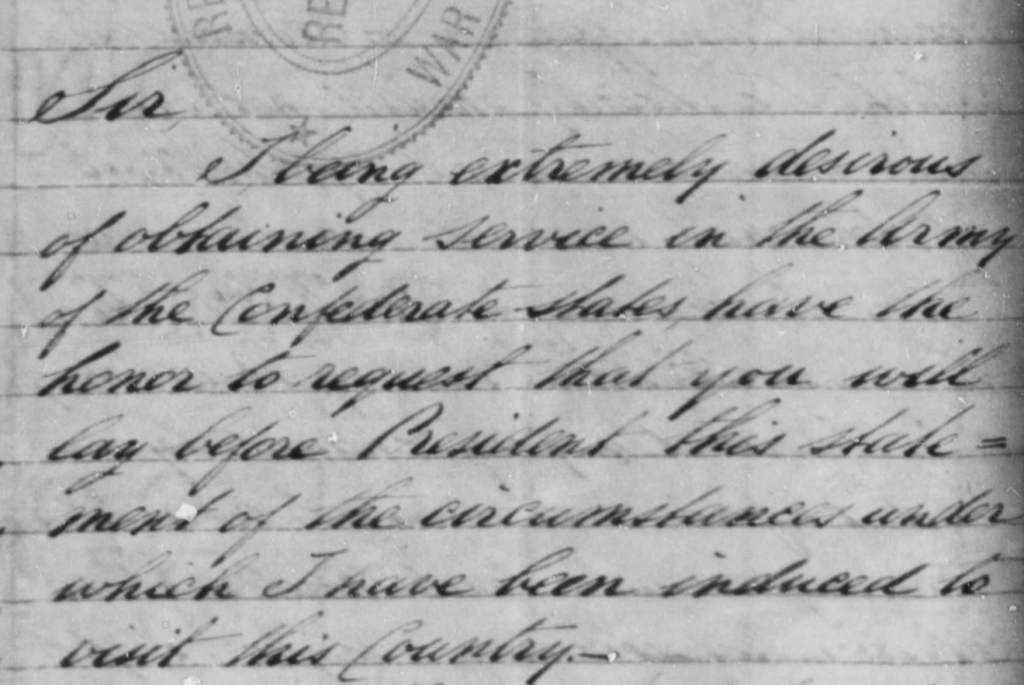
Davies sailed to Halifax, Canada, with his regiment and, sometime in early 1863, made his way to New Jersey, where he became acquainted with a government official from the Confederate States of America. The agent, impressed with the skills of a professional soldier, enticed Davies to join the Confederacy. The agent dangled the carrot of an officer’s commission, and Davies accepted. A May 1863 British newspaper reported that Davies was retiring from the 16th Foot.
Davies was hoping for a commission as a Major but was instead commissioned as a First Lieutenant and Drill Master and appointed Adjutant and Assistant Inspector General. His service file is filled with letters Davies wrote to Confederate officials, including the Confederate Secretary of War and President Jefferson Davis, asking for the desired commission. Davies served in Henry Heth’s Division, Walker’s Division, and the 7th Tennessee Regiment. In April 1864, correspondence shows that Davies offered to raise a Confederate battalion of British subjects living in the United States.
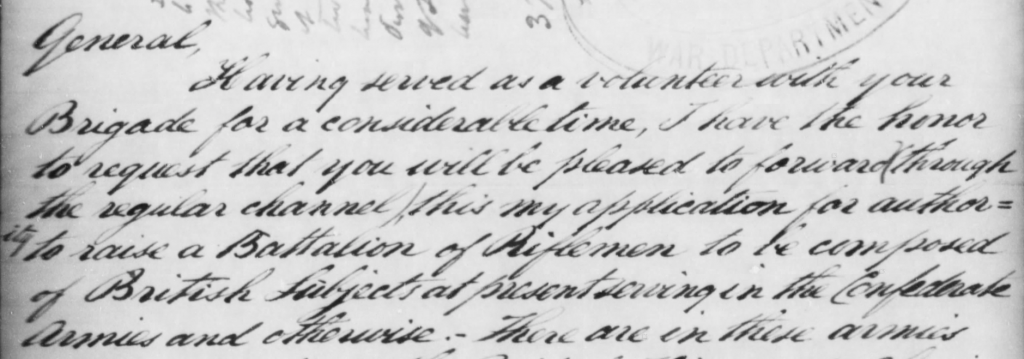
According to Confederate records, in the Spring of 1865, Davies was captured and taken POW. He was paroled at the Appomattox Court House on April 9, 1865, when Confederate General Robert E. Lee surrendered. He never received his desired commission as a Major.
Following the Civil War and with his U.S. military career in shambles, Davies left the United States and sailed for New Zealand. He rose through the military ranks in New Zealand, becoming a constable in the Armed Constabulary and serving in the New Zealand Wars. His financial situation remained precarious, and in 1872 he was sued for failure to pay an innkeeper 20 pounds, saying he didn’t pay because “he had not the money.”
Sydney H. Davies died in 1915 at the age of 77. He is buried in Dunedin, New Zealand.
If you would like to learn more about Sydney Herbert Davies and read the transcribed letters in his military file, see his Memorial here. Search additional military records today on Fold3®.

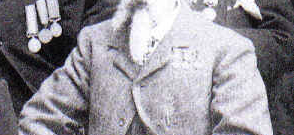
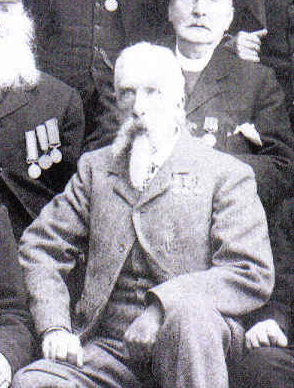

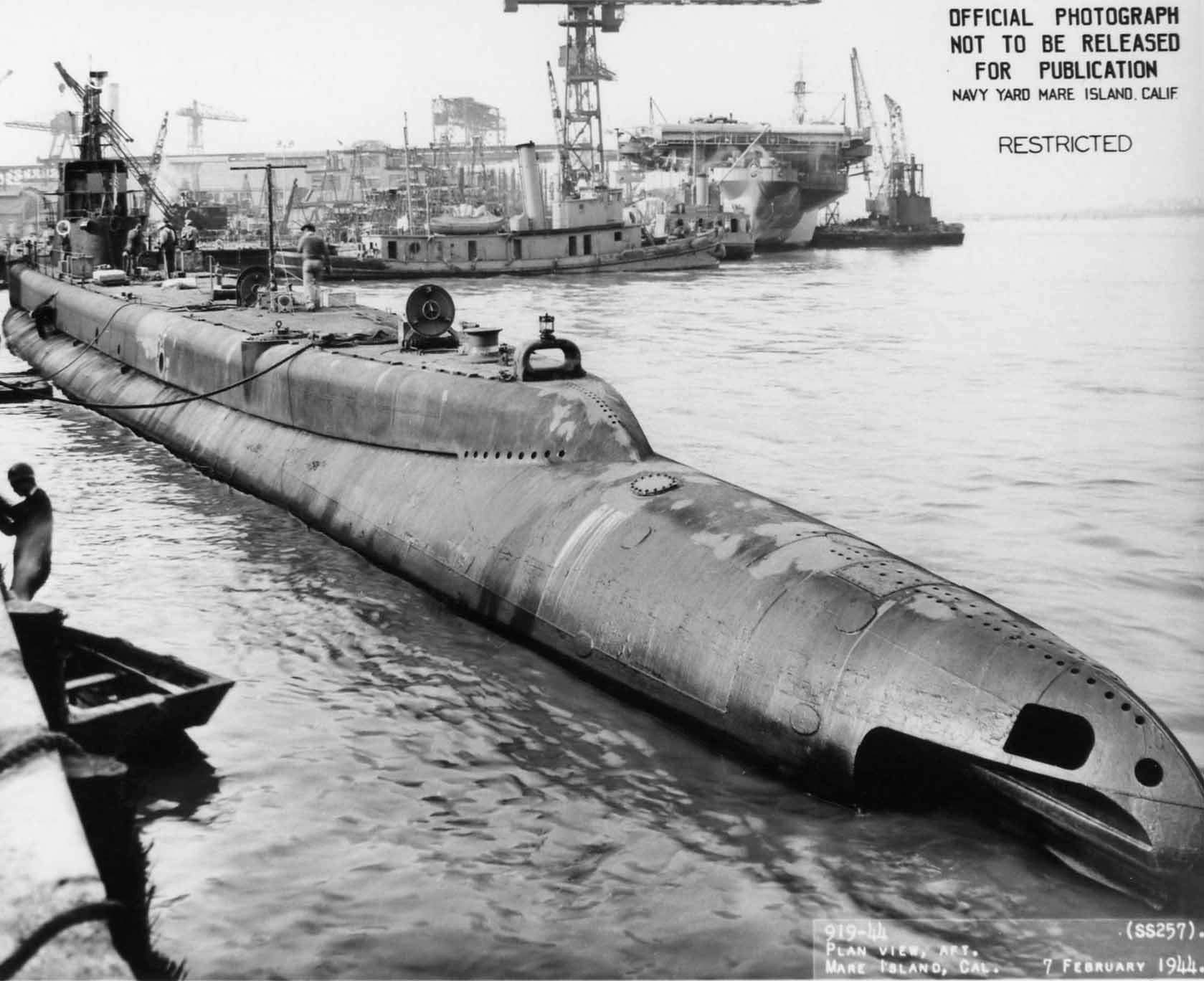


Davies definitely did not “serve the United States” or have a “U.S. military career.” He fought against the United States as a soldier in the Confederate Army. That’s a big difference.
Alway………….
Yes, CSA is not the United States
All aside, the spelling and service corrected, it was an interesting find. We would call him a mercenary by today’s standards
100 percent THIS. The belligerents in the Civil War are officially listed as:
(1) The United States of America
(2) The Confederate States of America
The latter was an UNRECOGNIZED “republic” of breakaway states that attempted secession from the United States of America, and therefore not a nation. Only after their surrender was this illegitimate “republic” dissolved by the USA.
THAT is what Mr. Davies served. He never served the United States of America in any capactiy. This needs to be corrected/clarified in the headline and lede.
he was serving in the US. The story is about 3 services. Pay attention and mind your own business
Confederate soldiers were recognized by Congress as US military veterans, so from that standpoint you could argue he had a US military career. I’m a member of both the Sons of Union Veterans of the Civil War and a member of the Sons of Confederate Veterans. My great great grandfather perished of small box while a POW at Fort Delaware. At least one brother and a cousin were also in Tennessee CSA cavalry units, but survived the war. A great great uncle served in a Kentucky (Union) cavalry unit. None of my Confederate ancestors owned slaves, but my Union ancestor’s family did. None were fighting to keep or preserve slavery. The Kentucky ancestor was fighting to maintain the Union and my Tennessee ancestors fought because their state was invaded.
Absolutely! I have offended friends most recently about speaking out about the renaming of American military bases. They never should have been named after traitors in the first place.
You are right. He did not have a U.S. military career. He joined with the rebellion – and lost.
It seems that he disgraced himself in three countries. Better that he be forgotten.
Mark, you make a good point. He did, however, serve in the UK, United States, and New Zealand. Thanks for pointing this out.
Davies was a TRUE AMERICAN
Calm down there Karen. He served in the military of the Confederate States of America, which was at the time IN the United States of America. So potato, potato. Still, an interesting character and one who used the only trade and skills he knew, soldiering, to avoid arrest, and obtain food, shelter, transportation, and income.
He was a hero for old Dixie.
Was is Halifax, Nova Scotia and not Halifax, New Jersey?
Good question. Hard to imagine he ran into a Confederate government in New Jersey in 1863.
Yes, it was definitely Halifax, Nova Scotia. It was a transcription error. The handwritten “N.S.” in the original document could easily be misread as “N.J.,” but the second letter matches other instances of the letter “S” in the document.
Thanks TS! The manuscripts can be so difficult to decipher.
JH, to clarify the Halfax, Nova Scotia and Halifax, NJ question, I took this information from a letter Davies wrote where he described meeting a Confederate government agent at Halifax, NJ. After further research, he possibly sailed into Halifax and then travelled to New Jersey where he met the CSA agent. See this letter: https://www.fold3.com/image/68785479?ann=011af050-fff0-11ed-97b2-81f95a7f0128
He was an interesting man. It seems to me he was more interested in personal glory rather than patriotic service. I agree with the person that called him a mercenary while in the United States. Serving for a group of individuals trying to overthrow the legitimate government of the USA was not serving in the armed forces of America. I had family members that served on both sides. The Union Army defeated the army rightly labeled confederates or rebels, who were trying to become the United States by overthrowing the legitimate government.
Seems that he was anyone’s for a commission. He was seeking his father’s approval or better pay due to his indebtedness.
Cedar Flatt,
The South was invaded by soldiers of the United States Army. Most southern families did not own slaves. The men were willing to form an army to defend their families and their homes.
The pillaging, burning and salting of their fields rendered the women and children helpless and hungry.
Remember that President Lincoln only declared emancipation in specific states. Other slaveholding states were let alone.
And then came Sherman, with a will to burn, rape and slaughter, fully supported by Lincoln, that left the citizens destitute.
Reconstruction wasn’t pretty by any means. What land still owned was highly taxed. Farmers planting their salted fields produced no crops rendering them helpless to save their farms that were then sold for taxes to the invading northern carpetbaggers.
The story goes on and on but realize that history is usually written by the victors.
A war of economics and politics.
Ignorance is bliss. Damn be the facts, full speed ahead. The CSA was NEVER “trying to overthrow the legitimate government of the USA”. They wanted to secede from the USA … it was Abraham Lincoln who invaded the southland all the while refusing to meet with representatives of Virginia, North Carolina, and Tennessee and then calling on those states to send their sons for an invasion of the seceding states.
Not unlike “Lincoln freed the slaves” … the preliminary Emancipation Proclamation was a threat to the seceding states but would not be enforced if they put down their arms. When the Proclamation was issued in January it freed the slaves in any areas still in rebellion … hence slaves in New Orleans, Washington, Marylane, Delaware, etc … were still slaves.
Certainly complicated issues. This seems to be loose with the facts just as the press, politians, and pundits are today. I have been around over 75 years and voted in every election but have never heard so many unapologetic lies being spread … that begins for me some 60 years ago when LBJ floated the “fact” that electing Barry Goldwater would bring world war destruction … of course who was it that sent 100s of thousands of young Americans to Vietnam?
Thank you Fold3 for sharing the interesting story of Sydney Herbert Davies!
There was no plan to overthrow the US government. That would have been a civil war. It was not that! The southern states legally seceded and formed a new nation with a constitution similar to that of the US. All would have been well but for Lincoln’s naval blockade of the harbor where Fort Sumter lies, thereby forcing the hand of the South Carolina militia. Lincoln wanted the southern states back in the Union so they would keep paying the exhorbitant tariffs forced upon the southern states via the Morrill Tariff Act. It’s the age old ‘follow the money’ deal. Although slavery was an issue, it was not the issue which caused the war. Look it all up!
He served in an army that was a sworn enemy of the Unites States. Hardly a servant of the country.
Can you say overthrow the rightful government four more times in that paragraph. Also, the CSA SECEDED FROM THE USA. A declaration of war was sent by, what was as far as the states forming the CSA, a duly elected government and President. This was not a military coup, or a foreign army invading the United States, this was former US citizens that had formed, voted on, and established a government they felt had their interests at heart. Unlike our current US government. Secession is not the same as sedition. Something many people do not understand, especially north of the Mason Dixon Line.
I didn’t see an edit box, but I meant to write small pox, not “small box.” Mea culpa.
I have never heard of Halifax, New Jersey and I am native of New Jersey. Is it now under a different name?
I am guessing they meant Halifax, Nova Scotia.
Thanks for bringing this up. I took this information from a letter Davies wrote where he described meeting a Confederate government agent at Halifax, NJ. After further research, he possibly sailed into Halifax and then travelled to New Jersey where he met the CSA agent. See this letter: https://www.fold3.com/image/68785479?ann=011af050-fff0-11ed-97b2-81f95a7f0128
After a quick “look up “ there were between 33,000 and 55,000 soldiers recruited from Canada at the start of the civil war. Canada was not officially Canada at the time and were British soldiers. Quite possibly from Halifax NS.
Thanks Fold3. For all you are doing!
Many greats granddaughter of every war on land and sea of America since 1607
North and South – all Americans!!
Davies was a TRUE AMERICAN
Zelda? He literally was not Even an American.
Brothers Ray and Dave Davies of The Kinks British rock band pronounce their name – Davis.
Not really interested in this type of history about a chancer with no moral compass. I know some people would find this interesting, but I’m not one.
The article does not mention progeny. Was he an un-married sperm donor? Was the Davies family in my tree related to this Davies?
Then you are not really interested in History at all if it must align with your idea of a moral compass.
@ Cedar Flatt, the “rebels” were not “trying to become the United States by overthrowing the legitimate government.” They were trying to LEAVE the United States and become their OWN country, just as their fathers and grandfathers had left English rule. The thought was that they joined the Union voluntarily, why couldn’t they voluntarily leave. The North began the war by objecting to their departure, and while the first shot was fired at Ft. Sumpter, it was AFTER South Carolina left the Union and the Union forces refused to leave South Carolina. It was also after the Confederate States of America had been formed, largely based on the initial confederacy form of government of the fledgling United States, before the Constitution created a Federation, or Federal, form of government for the former colonies. It is also worth noting that the first year and a half of the war were entirely defensive on the part of the South. The battles were all to defend southern soil against the presence and perceived invasion of northern forces. That is clearly not an attempt to overthrow the federal government; it was merely an effort to be left alone to go their own way. Please study history a little more thoroughly.
Melissa,
Yes.
In addition. The northern factors wanted to prevent the South from trading its cotton directly with European buyers which they wanted to do.
Cotton was equal to gold and by possibly eliminating the northern middlemen the growers would have prospered. Economics shaded by slavery.
Remember that Lincoln held on to his Emancipation declaration until a time that coincided with a battle victory to gain more publicity. Heart or politics?
Slavery was a terrible thing and still is ongoing in parts of the world.
Gettysburg is not in the South
Yes. He served two nations and a rebellion
Yes. Thank you, Melissa.
You said all that without using the word “slavery” even once. How very blind of you.
Reading the different reactions in the comments to this article is fascinating. I’m a first generation American who has lived the first half my life in yankeeland and the other half in the heart of the former confederacy. I for one will take the south over the north any day, all day long. I love reading history. Thank you Fold3.
You all need to revisit your history books, which weren’t all that great, slavery and the rights of the American people were the main focus of the Civil War. Just as people are “fighting” for rights at this time so the Northern States were doing somewhat the same during that war. It takes a lot of research to actually learn what happened during that war. Spend a few days in your libraries and really learn what this country fought for on both sides.
After spending over 30 years portraying a northern farm worker not a slave but an owner who had to run her farm with only the farm workers to help, mostly women, I found out what we fought for, on both sides. Melissa you have a very good understanding. As a “Yankee” I think both sides were a bit to blame. We are still fighting that race war now.
Regarding Halifax, the Fold3 transcription of the letter certainly says Halifax N.J. However, if you turn the letter upside down and scroll over to the other column, you see what I interpret as “Sydney Davies”, the subject of this discussion. That “S” is formed exactly the same as the “S” in what I interpret to be Halifax N.S., not Halifax N J.
We can also discuss Sydney’s third area of fighting. New Zealand was not an independent country in the 19th century, it was a colony of Great Britain, like Canada. By 1969, the date of the report linked in the article, the Armed Constabulary has been formed into a regular colonial army. https://natlib.govt.nz/records/22370934 He was back to fighting for Britain.
I am having a hard time reconciling his birth year of 1838 + 6 years in Navy + 6 years in Army in England…he would have been 23 when Civil War started??? I thought well maybe he went in Navy as a kid…but that would have made him about 11 just to satisfy the 12 years of service right??? If he entered CSA in last year of War he was 27, which means, at the oldest, he entered Navy at 15 (and all time being consecutive, which I dought!)
It was not uncommon for young boys (11-15), generally from families of military men, to serve as midshipment on British naval vessels during that time period.
Many call Confederates traitors but even Constitution Historians don’t all agree. There’s evidence that can be interpreted both ways meaning States had a right to leave the Union where others argue not true. Funny even today there’s the argument between States rights versus Federal domination of States.
If as some Constitution Historians who believe States had the right to leave the Union this would mean the use of the word Traitor is wrong.
Would it also mean the Revolutionary soldiers were traitors too? To me, no but the Brits could make that argument.
Trev,
Davies was born in 1838. He enlisted in the Confederacy in 1863; 1863 – 1838, he was 25 when he joined the Confederacy. 25 – 12, he was probably 13 when he joined the British Navy if he had no breaks in service. Since he missed his court date because his regiment was sailing to Canada, I think it is safe to assume that his service was consecutive.
Fascinating article. I really enjoyed this. Thanks so much.
In 2023, it is interesting to still hear folks relitigate the circumstances and reasons surrounding the American Civil War. It remains a tragic chapter in our nation’s history. But what is also tragic are the circumstances leading up to the war. And it is even more fascinating that all this discussion was prompted by a British subject who was a mercenary soldier seeking a commission in any army that would employ him. For all we know, if given the opportunity, he would have accepted a leadership position with the Tans who were sent to Ireland to terrorize and oppress the Irish people. In large part, the American South was an agrarian society mostly dependent on the cotton trade. For that purpose, slavery was institutionalized. A dark and ruinous stain on our history. I wonder how the enslaved people brought to this country against their will would have regarded the prospect of secession? I think we would know the answer to that question, especially if one’s freedom was at stake. Yes, political and economic forces were promulgated to have an impact and the South suffered incredible damage and hardship during and after the war. But at least we can say the institution of slavery in the country was broken. If the South had prevailed, that blight may have continued for decades and people would have been oppressed for much longer. Of course, after the war it took decades for laws guaranteeing greater freedoms to evolve.
Great comments, and an interesting read. Just a few points. Slavery was indeed at the heart of the division between the political camps, but that division existed from the onset of the constitutional agreement between the states. So that ‘marriage’ if it became unbearable could dissolve. The final straw as written in period history, not by 20-20 hindsighters like us, suggests the south was greatly concerned of abolitionists arming the slaves and leaving their land and people in ruins like they saw happen mostly in the Caribbean, and a prominent Virginia family was murdered by just such an uprising. After re-forming their own government, all federal forts were relinquished to the new country (suggesting acceptance of the fact), except Ft. Sumter. After some hesitation and some states re-thinking their decisions, the garrison at Ft. Sumter was warned to get in their bunkers that shelling was imminent. No one was harmed until Maj Anderson after surrender asked to fire a shot as a salute. A cannon exploded killing one soldier. That was Lincoln’s excuse to call upon SC’s sister state (still in Union) to send 70,000 troops to put down the rebellion. NC promptly succeeded, congealing ‘Union’ in the south. Lincoln got his war. The South knew slavery was ending, but wanted it to end on suitable terms, just like it did in Brazil about 15 years later, the last country in the western hemisphere to do so.
The total ignorance of our Yankee friends is embarrassing. The south had conscription for its soldiers, all did not volunteer, much like today. There as a stiff penalty if refusing to serve. Also contrary to ignorant Yankees, the majority did not own slaves in the south. Some free blacks did own slaves.
Following the war, most all Blacks remained in the south, mostly with their previous white families. as tenant farmers or employees. Much of the south lands are now owned by previously black ex slaves families. The land was given to most by the white families they continued to work for.